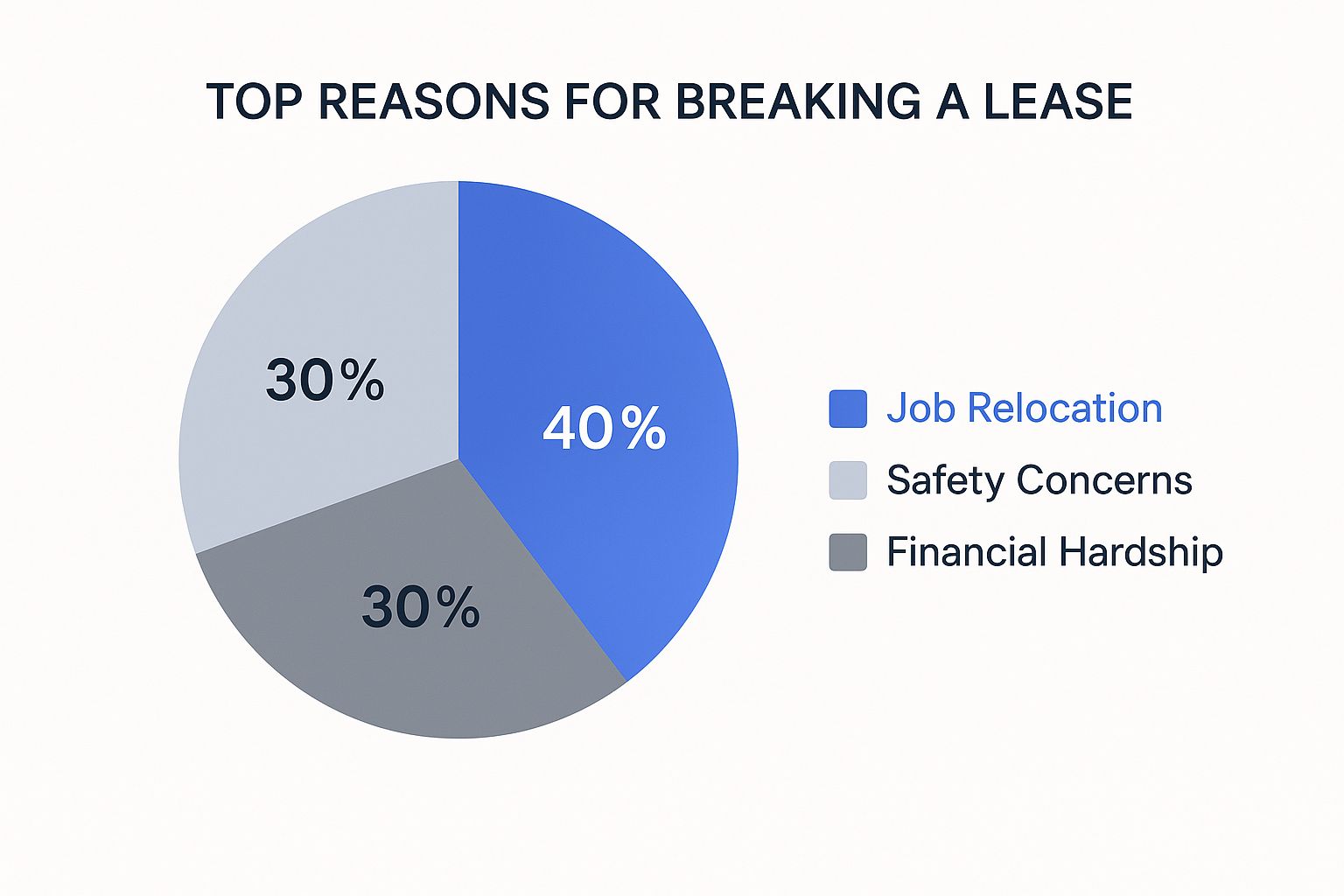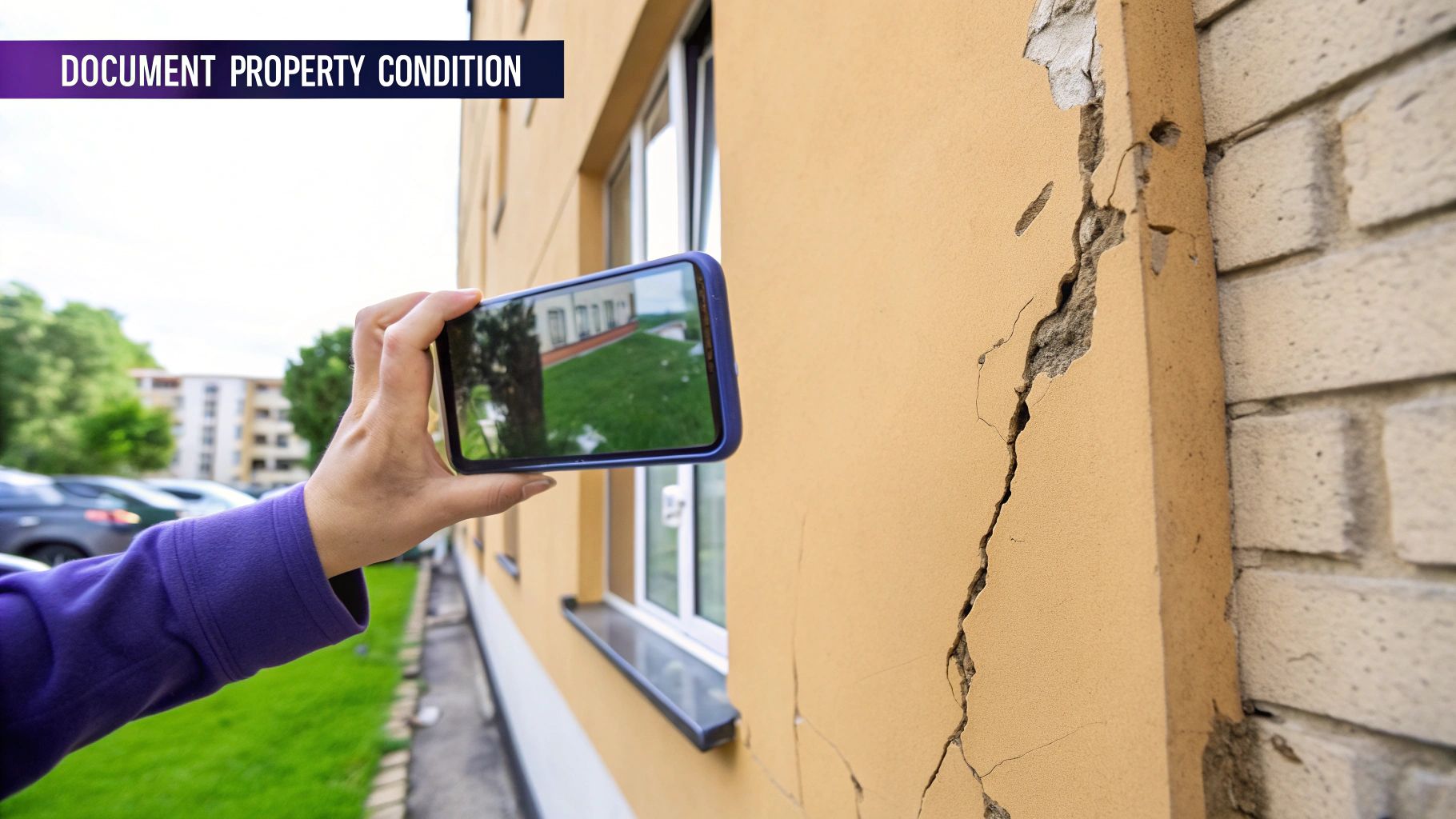
Understanding Your Lease Like a Pro
Most renters approach their lease with a sense of dread, like it's some unbreakable contract. But here’s a little secret: it's not a life sentence. It’s actually a negotiable agreement, and knowing what’s in it is the first step to taking control of your living situation. You'd be surprised how much wiggle room there often is if you just know where to look. For a deeper dive into lease terms, check out this helpful guide: Understanding Lease Terms.

The infographic above shows why people usually look into breaking a lease. It’s a pretty common situation. Job changes, safety concerns, and financial issues make up a whopping 90% of the reasons people want out. This just goes to show how common life changes can lead to this. And it likely means your landlord has seen it all before.
Breaking a lease isn’t about finding loopholes. It's about knowing what your options are, the ones already in your lease. Many leases include an early termination clause. This clause usually explains the specific requirements and costs involved in breaking the lease early. This could mean paying a fee – maybe two months' rent – or finding someone to take over your lease. While this might seem daunting, it’s often a more predictable and affordable option than getting sued for breaking the contract.
Negotiable vs. Non-Negotiable Costs
Knowing the difference between negotiable fees and non-negotiable penalties is key. Late fees are often negotiable, especially if you’ve always paid on time before and have a good reason for being late. However, penalties for damage to the property are usually non-negotiable because they reflect the actual repair costs. This is where a good relationship with your landlord can really come in handy.
Breaking a lease can be tough financially because of possible penalties. Even landlords are feeling the pressure from inflation and rising operating costs, which can lead to more tenants defaulting on rent and vacant properties. For more on the challenges landlords face, you can check out this resource: Lease Administration Challenges. This emphasizes how important it is to understand your lease and negotiate effectively to minimize the financial hit of breaking your lease. So, do your homework, and remember – your lease agreement is a starting point, not the final word.
The following table outlines some common scenarios and potential costs you might encounter when breaking a lease. It also highlights areas where negotiation might be possible, along with typical timelines involved.
Common Lease Breaking Scenarios and Typical Costs Comparison of different lease breaking situations and their associated penalties
| Scenario | Typical Penalty | Negotiation Potential | Timeline |
|---|---|---|---|
| Job Relocation | 2 months' rent | Moderate, especially if you find a replacement tenant | 30-60 days |
| Military Deployment | Often waived with proper documentation | High | Varies, usually immediate |
| Unit Uninhabitable (e.g., major repairs needed) | No penalty, lease often voided | High | Depends on severity and local laws |
| Domestic Violence | Early termination with minimal penalty | High, protected by law in many jurisdictions | Often immediate |
| Death of Tenant | Estate responsible for remaining lease term, but often negotiable | Moderate | Varies depending on lease and state laws |
As you can see, the penalties and potential for negotiation vary widely depending on the circumstances. Understanding your situation and the applicable laws is crucial for navigating the process effectively. Don’t be afraid to advocate for yourself and explore all available options. Remember, knowledge is power!
Legitimate Exit Strategies That Actually Work

So, you're looking to break your lease. It happens. Life has a way of changing our plans, and sometimes your current living situation just doesn't work anymore. Take a deep breath – before you stress, there are absolutely legitimate ways to get out of a lease, and many landlords are more understanding about these options than you might think. A smooth transition is often preferable to a legal battle or a vacant property.
Protected Exits: Know Your Rights
Certain situations legally allow you to break a lease without penalty. Military deployment orders, under federal law, allow service members to terminate their lease without penalty. Domestic violence is also recognized in many states as a legitimate reason for lease termination, providing legal protections and facilitating safe relocation. If you’re dealing with health issues that make your current housing unsuitable, proper documentation of these problems can be grounds for breaking your lease.
Beyond the Obvious: Constructive Eviction
Here's one you might not know about: constructive eviction. This happens when a landlord's negligence makes the property unlivable. Imagine persistent mold, a broken heating system in the dead of winter, or ongoing safety concerns. I've personally seen tenants successfully document issues ranging from broken locks to incessant construction noise, using this evidence to justify breaking their leases without any financial repercussions. The key? Meticulous documentation. Photos, videos, emails, and formal written complaints all contribute to building a solid case.
Flexibility is Key: The Changing Lease Landscape
It’s interesting to note that the whole concept of leases is changing. There's a growing movement towards more flexible lease terms, especially with businesses facing economic uncertainty. This shift is impacting both residential and commercial properties, allowing for adjustments as circumstances change and potentially reducing the need for complete lease termination. Discover more insights. While not a guaranteed way out, this trend points toward a greater willingness to negotiate and find alternative solutions. You might also find this helpful: Cancel the Lease Agreement.
Breaking a lease doesn’t have to be a drawn-out fight. Knowing your legal rights and approaching the situation strategically can significantly increase your chances of a smooth, cost-effective exit. Proactive communication and a well-documented case are your best allies.
The Psychology of Landlord Negotiations
After talking with dozens of property owners, I’ve learned something important: most landlords are pretty reasonable. They don't like dealing with difficult tenants, long vacancies, or legal battles. And this, my friend, is your negotiating power.
Understanding Landlord Motivations
What's the main thing landlords care about? Profitability. An empty property means money down the drain. So, they might be surprisingly open to letting you break your lease, especially if it avoids a bigger headache like a messy eviction. I know someone who needed to relocate for work. She proactively gave her landlord a detailed plan for finding a new tenant. The landlord, happy about the continuous income, agreed to let her out early with a small penalty.
I also knew a grad student struggling financially. He negotiated a graduated payment plan with his landlord, paying less rent initially and gradually increasing it until the lease ended. Win-win: he could stay, and the landlord didn't lose all the rent. These real stories show the power of understanding your landlord's perspective.
Timing Is Everything
Knowing when to talk to your landlord is almost as crucial as how. Don't call at the end of the month when they're busy collecting rent and juggling admin tasks. Try mid-month when things are usually calmer. This can make a big difference in having a productive conversation. Think about it – would you ask your boss for a raise during their busiest week? Probably not.
Framing Your Request: Solve Their Problem, Too
When you do talk, frame your request as a solution, not just your problem. Instead of saying, "I need to break my lease," try, "I'm in a situation that might make it hard to fulfill the lease. Could we discuss options that work for both of us?" This instantly makes you a problem-solver, not a problem-creator. It’s a small change, but powerful.
Concessions and Expectations
Landlords are often willing to compromise, especially if you're proactive and cooperative. This could mean a lower early termination fee, letting you find a replacement tenant, or agreeing to a payment plan. But be realistic. While sometimes you can avoid penalties entirely, it’s not always possible. Be prepared to negotiate and find a middle ground. Think of it as working together to minimize losses and avoid unnecessary conflict.
Using AI Tools to Decode Your Lease Agreement
Let's be honest, lease agreements are infamous for their density. They're full of legalese designed to protect the landlord, not you. Thankfully, AI-powered tools can help even things out by translating that complicated language into plain English. This gives you the power to understand your rights and obligations when you're thinking about breaking your lease.
This screenshot from ContractsByAI shows how these tools work:  You simply upload your lease, and the AI picks out key parts, like early termination clauses and any penalties. The platform then explains these clauses in easy-to-understand language, pointing out potential costs and showing you your options. You might find this interesting: learning more about AI for contract review.
You simply upload your lease, and the AI picks out key parts, like early termination clauses and any penalties. The platform then explains these clauses in easy-to-understand language, pointing out potential costs and showing you your options. You might find this interesting: learning more about AI for contract review.
How AI Can Help You Break Your Lease
AI document analysis tools can be a lifesaver when you're trying to figure out how to break your lease. Here's how:
Deciphering Termination Clauses: AI can break down those complicated termination clauses, explaining exactly what you need to do to legally break your lease and what penalties might come with it. This clarifies the often-confusing language about ending your lease early.
Calculating Potential Penalties: Many leases have complicated ways of calculating penalties for breaking the lease early. AI tools can help you understand how these penalties apply to your situation, giving you a better idea of what it might cost you.
Identifying Tenant Protections: Some leases bury important tenant protections in legalese. AI can help you find these protections, making sure you know your rights and options. This helps you avoid being taken advantage of and understand everything in your lease agreement.
Using AI Wisely
While these AI tools are powerful, they shouldn't replace legal advice. Think of them as a knowledgeable friend helping you understand the basics. Always double-check the AI's analysis with your state's tenant laws to make sure it's accurate. If your situation is complex, talking to a real estate attorney is always a smart move. They can give you personalized guidance and make sure you're making informed decisions. Combining AI analysis with professional legal advice gives you the most complete understanding of your situation.
Smart Financial Planning for Lease Exits
Breaking a lease can feel like a financial freefall, but with a bit of savvy planning, you can soften the landing. Sure, there are the obvious costs like termination fees staring you in the face, right there in your lease agreement. But it's the sneaky, less obvious expenses that can really knock you off balance: things like overlapping rent payments if you haven't found your next place, potentially kissing your security deposit goodbye, and the often-underestimated cost of moving itself. A little foresight can save you a lot of headaches (and cash).
Budgeting for the Unexpected
First things first: build a realistic budget. Don't just jot down the big, scary termination fee and call it a day. Think granularly. Packing supplies, movers (if you're using them), cleaning fees, application fees for your new digs, and even temporary housing if your move-out and move-in dates don't sync up perfectly – all of it needs to be in there. A detailed budget is your financial GPS, helping you anticipate every bump in the road.
I once had a friend who broke her lease thinking she was only on the hook for two months' rent. She completely spaced on the overlap with her new lease, the movers, and the cleaning fees for her old apartment. Suddenly, what she thought was manageable became a real financial burden. Don't let that happen to you!
Timing is Money: Strategic Exit Planning
It might sound strange, but when you break your lease can seriously impact your wallet. Let's say you're in a college town. Breaking your lease during the summer slump, when demand is low, could mean your landlord struggles to find a new tenant quickly. Guess who's stuck paying rent until they do? You. On the flip side, breaking your lease during high-demand periods could significantly shorten your financial obligation. These seemingly small timing details can translate into big savings.
Negotiation and Payment Plans
Even if your lease spells out penalties in black and white, don’t be afraid to negotiate. Landlords are often more flexible than you think, especially if you approach them with a proactive solution. Offering to help find a replacement tenant or suggesting a payment plan can work wonders. I've seen tenants successfully negotiate lower termination fees or even get a chunk of their security deposit back simply by communicating openly and being willing to work with their landlord.
Interestingly, the lease management market is becoming increasingly complex. The industry is expected to grow at a 5.9% CAGR, reaching $6.35 billion by 2028. This growth reflects the increasing demand for efficient lease administration, highlighting the importance of being informed and proactive in navigating your lease agreement. Discover more insights on lease management growth.
Turning Losses into Opportunities
Don't just write off lost money as a sunk cost. Challenge any questionable charges, document everything meticulously, and know your tenant rights. I know someone who got a large portion of their security deposit back simply by documenting pre-existing damage to the apartment. A little persistence and good record-keeping can go a long way.
To help you visualize the potential financial outcomes of breaking your lease versus sticking it out, let's look at a few common scenarios. The table below compares the costs associated with each option, offering a clearer picture of what might be the best course of action for you.
| Situation | Cost of Breaking | Cost of Staying | Recommended Action |
|---|---|---|---|
| High demand for rentals, easy to find a replacement tenant | Low termination fee, potentially recouped security deposit | Remaining lease payments | Break Lease: The cost of breaking is likely less than the cost of staying. |
| Low demand, difficult to find a replacement tenant | Higher termination fee, potentially forfeiting security deposit, additional rent until new tenant found | Remaining lease payments | Analyze Carefully: Compare the potential costs of covering rent until a new tenant is found with the cost of staying. Negotiating a payment plan with the landlord might be beneficial. |
| Significant personal hardship (job loss, medical emergency) | Potentially reduced termination fee through negotiation, possible partial security deposit return | Remaining lease payments, potential late fees if unable to pay | Negotiate and Document: Open communication with your landlord and thorough documentation of your hardship may lead to a reduced financial burden. |
| Minor inconvenience (found a better apartment) | Standard termination fee, potential security deposit loss | Remaining lease payments | Negotiate: Attempt to negotiate with the landlord. If unsuccessful, evaluate whether the cost of breaking the lease is worth the benefit of the new apartment. |
As you can see, the best course of action depends entirely on your specific situation. Use this table as a starting point to weigh your options and make the most informed decision. Remember, knowledge is power, especially when it comes to navigating the complexities of a lease.
Building Your Protection Strategy

So, you're thinking about breaking your lease? I've been there, and trust me, the first thing you need is a solid plan. Documentation is absolutely key. It's not just about checking off boxes, it's about building a strong case and protecting yourself. Think of it as your safety net, potentially saving you thousands in unexpected charges and legal battles.
Creating a Powerful Paper Trail
When I say document everything, I mean everything. Before you even think about moving out, grab your phone and take photos and videos of your apartment. Focus on any existing damage, no matter how small. I once saw a tenant get charged for a stain on the carpet that was already there when they moved in. Date-stamped photos saved the day.
Every single interaction with your landlord needs to be in writing. Email, text, even a good old-fashioned letter – it all counts. "I talked to the landlord" just doesn't cut it. You need a written record of every conversation, every agreement, every disagreement. If things go south, this documentation will be your lifeline.
Documenting Like a Pro: Examples From the Trenches
Here's a real-world example: a friend of mine was charged for damage to the carpet that was already there when she moved in. Because she had taken photos on move-in day, she was able to prove her case and avoid the charges. Another tenant I knew was fighting an eviction notice, and his detailed records of communication with the landlord, including emails and texts, proved he had followed proper procedure and was being unfairly targeted. These stories aren't just anecdotes; they show how crucial thorough documentation can be.
Know Your Rights and Seek Support When Needed
Before you make any moves, understand your state-specific tenant rights. These rights can vary drastically and will significantly affect your options. Local housing authorities and tenant advocacy groups are incredible resources. They can help you understand your rights, navigate the legal maze, and negotiate effectively with your landlord.
When to Call in the Professionals
You can handle a lot of this process yourself, but sometimes you need expert help. If your landlord is being unreasonable, threatening legal action, or if the situation just feels too complicated, get professional legal advice. A lawyer specializing in tenant rights can provide personalized guidance and be crucial for protecting your rights. It might seem like an extra expense, but trust me, it can save you significant stress and money down the line.
Your Action Plan Moving Forward
Breaking a lease can feel like wading through quicksand, but with a good plan and the right info, it's totally doable. This isn't about shirking responsibility; it's about smartly navigating a life change and minimizing the financial and emotional headaches.
Prioritize and Organize: Your Game Plan
Instead of feeling lost, let's create a clear, actionable game plan:
Understand Your Lease: First things first, dig out that lease and really examine it. Use an AI tool like Legal Document Simplifier to cut through the legal jargon and find those key clauses about early termination fees and procedures. Knowing the rules is half the battle won.
Explore Your Options: Think about why you're breaking the lease. Then, research your legal rights and exit strategies specific to your state. Remember, things like military deployment, domestic violence, and truly awful living conditions often have special legal protections.
Communicate with Your Landlord: Talk to your landlord with a focus on finding solutions. Present your request as a shared problem and show you're willing to work with them. Maybe you can help find a new tenant, or work out a payment plan.
Timelines and Expectations: Keeping it Real
Different ways of breaking a lease have different timelines. Talking things out with your landlord might take a few weeks, but going the legal route could take much longer. Be ready for possible delays and have a backup plan.
Negotiated Agreement: Figure on 30-60 days to come to an agreement with your landlord. This gives you time to talk, find a new tenant, and get the paperwork done.
Legal Action: If you need lawyers or housing authorities involved, expect a longer process—maybe several months. Be prepared for the emotional and financial commitment.
When to Call in the Pros
Sometimes, going it alone just isn't the best move. If your landlord is being difficult, threatening you with legal action, or if the situation is complicated, get legal advice.
Unreasonable Landlord Behavior: Constant harassment, crazy demands, or refusing to communicate are all warning signs.
Complex Legal Issues: Arguments over security deposits, big financial penalties, or potential eviction definitely require professional help.
Breaking a lease isn't a failure, it's a transition. With smart planning and a proactive approach, you can minimize stress, protect your finances, and move on with confidence. A helpful tool to understand your lease and navigate all this is Legal Document Simplifier. It can save you time, money, and a lot of stress.